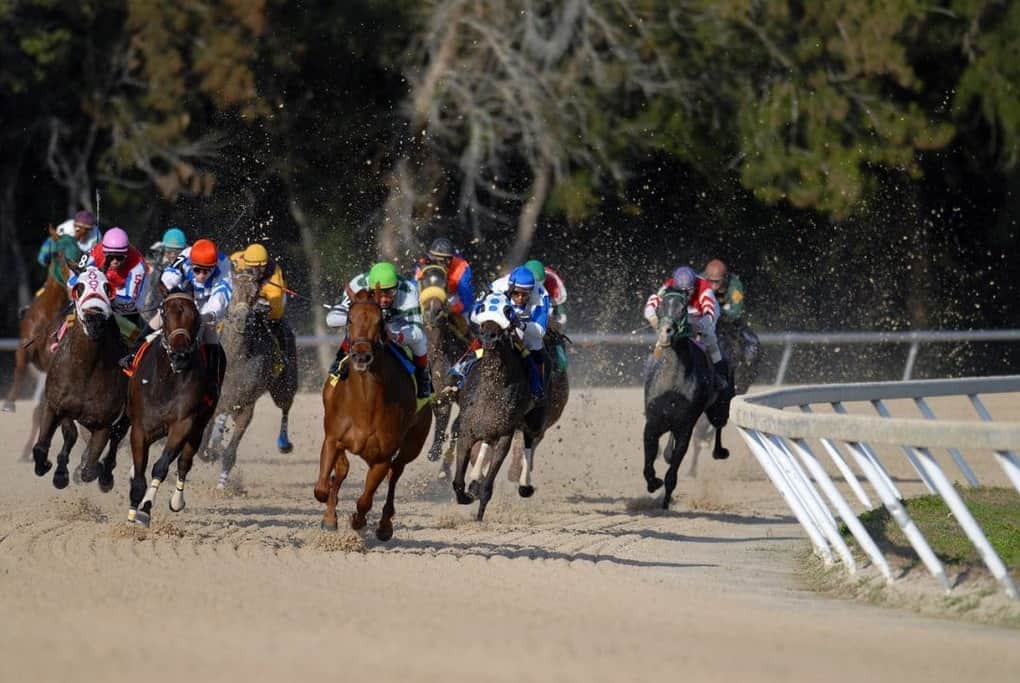
Horse Racing in Great Britain (UK): Why British Love Horse Racing
Linda Doran 11/14/2024Royal London ArticleHave you ever wondered why horse racing in Great Britain is so huge? The sport has so much appeal in this part of the world. British society as a whole is proud and protective of the history and traditions of British horse racing.
As a whole, It is undeniable that the British love horse racing. It is because the sport is deeply embedded in their history, with races dating back to as early as the third century. Horse racing in Great Britain is celebrated by people of all backgrounds; it is the “sport of kings” as well as the “people’s sport.”
Horse racing for the British is more than just a sport. It is an integral part of their British culture, a full-fledged industry, and an efficient way of promoting national unity.
Let’s look at the history of horse racing in the UK as well as some of the world-famous horse racing events in the area and the racehorses that reign supreme.
History of Horse Racing in Great Britain & UK

3rd Century – Horse racing was considered a professional sport in the UK. This was the time when English knights came back from the Crusades along with Arab horses. English horses were then bred with Arab horses, giving birth to the Thoroughbred horses that you see now in UK horse races. This breed is also exported all across the world and is meant not only for racing but also for the improvement of local breeds.
16th Century – The Kiplingcotes Derby, which was run in 1519, was the first recorded horse racing in UK history. This makes it the oldest horse race.
17th Century – James I came across Newmarket which will, later on, be known as the home of horse racing in England. The first ever Gold Cup in 1634 opened doors for the sport to be widely enjoyed by many.
1654 – Oliver Cromwell, an English General and statesman, banned horse racing in the UK. This resulted in the requisition of all horses. It took ten years for the sport to be restored.
18th Century – Royal Ascot was founded by Queen Anne. She herself was a horse and horse racing lover. That is why the opening race of every Royal Ascot is regarded as the Queen Anne Stakes.
1750 – All of the who’s who in horse racing met in Newmarket to form the Jockey Club. They sought to supervise and control the English horse racing.The meeting gave birth to a set of comprehensive rules, the first being that after the race it is imperative that the jockeys weigh themselves.
1779 – Sir Charles Bunbury, described as the “perpetual president” of the Jockey Club, and the 12th Earl of Derby was said to have tossed a coin to determine the name of the race they were about to launch. Heads, it shall be the Derby Stakes and the Bunbury Stakes if otherwise. While Lord Derby won the coin toss, it was Sir Charles Bunbury’s horse Diomed who won the first race.
1791 – James Weatherby was tasked to create and publish The General Stud Book. This contained a definitive record of the pedigree and family history of all race horses in England. In the book, you can see how every horse can be traced back to one of the three “Foundation sires,” namely the Byerley Turk, the Darley Arabian and the Godolphin Arabian.
1993 – The British Horseracing Board or BOB became the governing authority for horse racing in Great Britain. It assumed many of the responsibilities of The Jockey Club with modernisation in mind.
Indicated in the formal aims of the British Horseracing Board is this:
“As the Governing Authority for Racing, we will promote the interests of our sport and industry in whatever way we can. Working alongside others within Racing and the Breeding and Betting Industries, we will build on Britain’s reputation for providing to our customers the most integrity standards, as efficiently as possible.
We will work to attract and retain more racegoers and other customers, as well as racehorse owners. We will seek to maintain and promote horse racing as a competitive and attractive sport and betting medium. We also wish to see the best possible training and working conditions for those employed in the industry, and the highest possible standards of care for horses.”
2006 – The Horserace Regulatory Authority or HRA was established to assume the role of policing the sport.
2007 – The BOB and HRA merge to form what is now the British Horseracing Authority.
What is the oldest classic horse race?
The oldest classic horse race is The Doncaster St Leger.
Famous horse racing events in the UK
When talking about the most prestigious horse racing events in the UK, these are the ones that never fail to make it to the list:
The Cheltenham Festival
When is The Cheltenham Festival held? March each year
Where is The Cheltenham Festival held? Cheltenham Racecourse at Prestbury Park in Gloucestershire
When did The Cheltenham Festival begin? It was in 1815 when the first unrecorded flat racing meeting in Cheltenham began. It was only in 1818 that another meeting was staged on Cleeve Hill, and due to its success, construction of a grandstand began. In 1911 and up until today, the festival called Prestbury Park it’s home.
Why is The Cheltenham Festival famous? The fact that 71,000 spectators each day watch from the grandstands is testimony enough that the Cheltenham Festival is famous. Among many other things, the festival is known for the “Cheltenham Roar.” It is one of the Best Things to do in Gloucestershire.
“The Cheltenham roar is a cry made by the thousands of racing betting fans in the grandstands when the starter raises the tape for the first race of the festival. The noise is likened to a jumbo jet flying overhead and is the starting call for four days of amazing racing action.”
The Grand National
When is The Grand National held? April each year
Where is The Grand National held? Aintree Racecourse in Liverpool, England
When did The Grand National begin? In 1839, William Lynn founded the course and built a grandstand where the race, then known as the Grand Liverpool Steeplechase, took part.
Why is The Grand National famous? The Grand National placed many racehorses like Red Rum in the spotlight. It is also described as “the ultimate test of horse and jockey.” Aintree’s course is unique and challenging. It includes two of the world’s most testing fences when it comes to jump racing, as illustrated in the pictures below:
Royal Ascot
When is the Royal Ascot held? June each year
Where is the Royal Ascot held? Ascot Racecourse in Berkshire. Here is a transport guide from London to Ascot.
When did the Royal Ascot begin? It was in 1711 when Queen Anne spotted a clearing that she thought was perfect for horse racing. Being an avid fan of the sport, she sought to buy the land and have it prepared to become a racecourse. Not long after, the very first race called Her Majesty’s Plate took place.
Why is the Royal Ascot famous? Royal Ascot is attended by Queen Elizabeth II every year. Aside from the well-known knowledge that the Queen is fond of horses, there is also the fact that Ascot is just about six miles from Windsor Castle. The Queen, along with her entourage, sits at The Royal Enclosure. It is the most prestigious of all the three enclosures in Royal Ascot, and an entry there is definitely not easy to get.
Epsom Derby
When is the Epsom Derby held? June each year
Where is the Epsom Derby held? Epsom Downs Racecourse in Surrey
When did the Epsom Derby begin? No history of horse racing in the UK would fail to mention the story of the coin toss between the 12th Earl of Derby and his friend Sir Charles Bunbury. As evident in the name, Lord Derby won the bet, but it was Bunbury’s colt Diomed who won the first race.
Why is the Epsom Derby famous? The Epsom Derby is dubbed as Britain’s richest horse race. It is also regarded as the most prestigious of the five Classics. Even the word Derby alone became famous worldwide; the name, when attached to any horse race, pertains to horse stock of superior talent.
“The Epsom Derby has long been regarded as the richest and most prestigious flat race in the British racing calendar. Run over a mile-and-a-half, it carries a prize fund of at least $1.9 million, with the winner claiming just north of $1 million.”
Famous race horses in the UK
| RACE HORSE | BREEDER | OWNER | TRAINER | RECORD |
| Arkle | Mary Baker | Anne Grosvenor, Duchess of Westminster | Tom Dreaper | 35: 27-2-3 |
| Best Mate | Jacques Van’t Hart | Jim Lewis | Henrietta Knight | 22: 14-7-0 |
| Brigadier Gerard | John L. Hislop | Mr & Mrs. John L. Hislop | Dick Hern | 18: 17-1-0 |
| Desert Orchid | James Burridge | James Burridge, Midge Burridge, Richard Burridge, Simon Bullimore | David Elsworth | 70: 34-11-8 |
| Eclipse | William Augustus, Duke of Cumberland | William WildmanDennis O’Kelly | Sullivan | 18 starts, 18 wins, plus 7 heats |
| Frankel | Juddmonte Farms | Khalid Abdullah | Henry Cecil | 14: 14–0–0 |
| Red Rum | Martyn McEnery | Noel le Mare | Ginger McCain | 100: 24-15-23 |
Who are the royals who love horses and horse racing?
- Queen Elizabeth II
- Princess Anne
- Zara Philipps
- Prince William
- Prince Harry


Leave a Reply